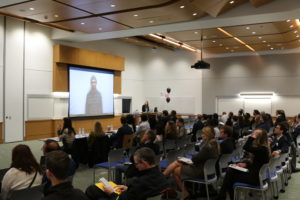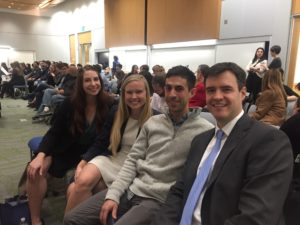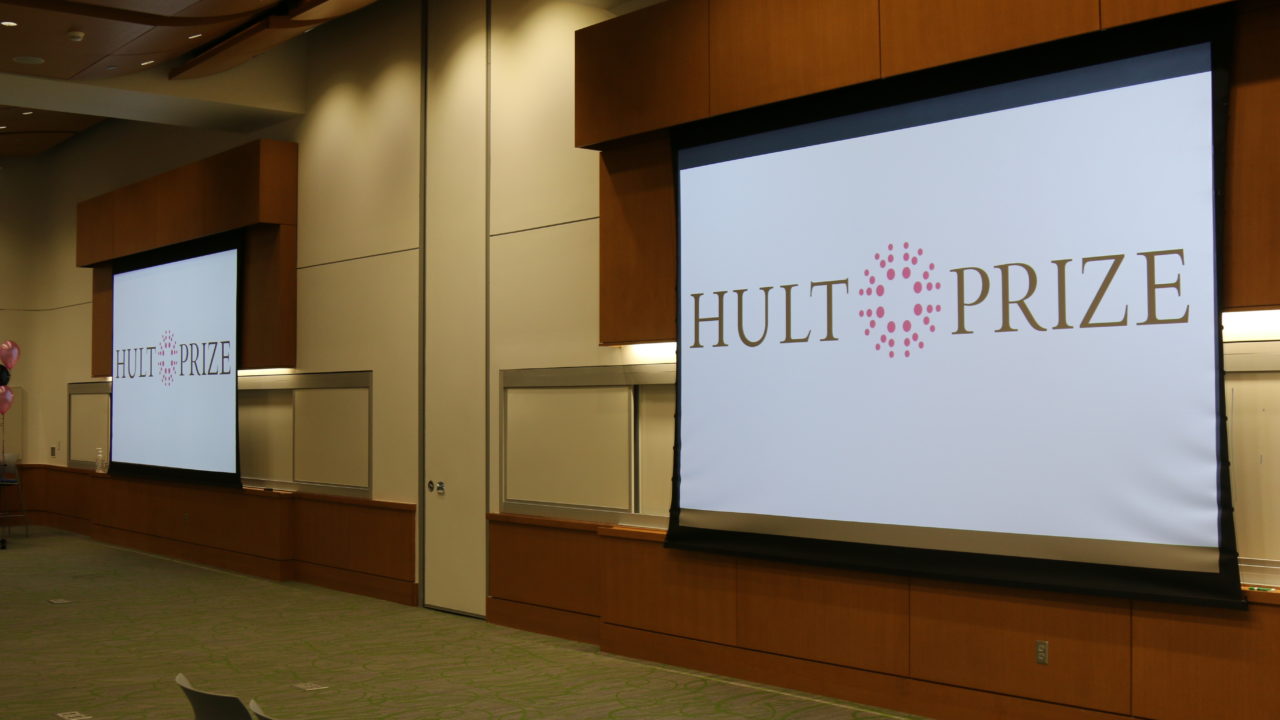By Nathaniel Luce
How do you harness the power of energy to transform the lives of 10 million people? That’s the challenge put to teams vying for $1 million in the Hult Prize competition, a global event that brings entrepreneurial-minded students together to solve some of the world’s most pressing societal problems through for-profit business.
Last Friday, Vanderbilt’s Owen Graduate School of Management and the Turner Family Center for Social Ventures (TFC) co-hosted a school-sponsored pitch competition at Vanderbilt’s Wond’ry, where graduate students from Vanderbilt Business, Education, Law, Engineering, and other programs competed for a spot in the Hult Regional Finals, held in January. As an officially recognized Hult Prize event, the Vanderbilt competition allows its winner to bypass the general application round.

The evening kicked off with video highlights of each team
“There was so much room for creativity and the opportunity for participants to pursue something they are truly passionate about,” said Christiana Newcomb (MBA’18), the Hult@Vanderbilt Director and a member of the TFC’s Programming Board.
This year’s challenge asks student teams to build a scalable, sustainable social enterprise that harnesses the power of energy to transform the lives of 10 million people by 2025. It defines six dimensions “ripe for transformation through energy-powered innovation”: connectivity; mobility; farming/food/agriculture; water collection/storage/transport; health and the human experience; and education.
This marks the third year that Vanderbilt has hosted a Hult competition event and the second that the TFC has organized it. As an interdisciplinary resource for graduate students across campus, the TFC is uniquely positioned to attract bright minds from various fields and bring them together for the competition. Each of the 12 teams that competed on Friday represented at least two graduate programs.
Getting Ready
The TFC invested significant resources into helping teams develop and refine their concepts and pitches in the month leading up to the competition. “We focused on providing additional insight into the energy transformation topic and everything that could fall under this umbrella,” Newcomb explained.
Each team was assigned a mentor to offer feedback and guidance along the way, and the TFC hosted a panel on alternative energy featuring Vanderbilt Law professor Michael Vandenbergh and a former energy consultant for the Tennessee Department for Environment and Conservation. Vanderbilt Business professor Brian McCann led a pitch workshop to help students outline their content in a clear, efficient way – a must when teams were limited to seven minutes for presentations.
The Pitches
Friday’s pitches offered a wide variety of energy-related solutions, ranging from low-cost cookstoves to refrigeration networks, telehealth, surveying tools, and solar-powered internet cafes.
“Because we have students from multiple disciplines competing, it was interesting to see the different approaches they took to tackle this issue and the breadth of industries represented,” said Newcomb. Teams initially pitched in three groups of four, with one team from each group selected to pitch again in the final round. The panel of nine judges included representatives from Vanderbilt faculty, Google Fiber, and the Tennessee Department of Environment and Conservation’s Office of Energy Programs. Judges measured pitches on scalability, impact, feasibility, disruptiveness, and alignment with the challenge.
The Final Round
The finalists addressed the energy challenge from different angles. Team Grounded transforms coffee by-products into livestock feed, reducing waste and creating a cost-effective alternative to corn and soy. FAM First proposed a mobile triage service that links families to health professionals during emergencies, saving hospitals energy and resources. SoLLago harnesses the cyclical energy ecosystems of lakes to provide power sources to underserved fishing communities in Africa.

Team SoLLago
In the end, SoLLago earned first place and a spot in the regional finals. Three of the team members have been in this position before – Kayla Armgardt (MBA’18), Nat Robinson (MBA’07, Law’18), and Tori Samples (MBA’18) advanced to last year’s Regional Finals in Dubai. Their fourth teammate, Adam Cohen (MS Mechanical Engineering) has a patent pending on a new batter technology to be deployed in their solution.
“We are thrilled to have the opportunity to represent Vanderbilt against this year at Hult,” said Robinson.
Team SoLLago will spend the next few months building the pilot. “We hope to compete in Africa this year so we can be close to our target market,” Robinson adds.
As the winners wait to learn which Regional Final they’ll be attending, the other teams still have an opportunity to make the Regionals through the general application round. It’s how the members of SoLLago advanced last year, and how some teams this year will keep their Hult dreams alive.
